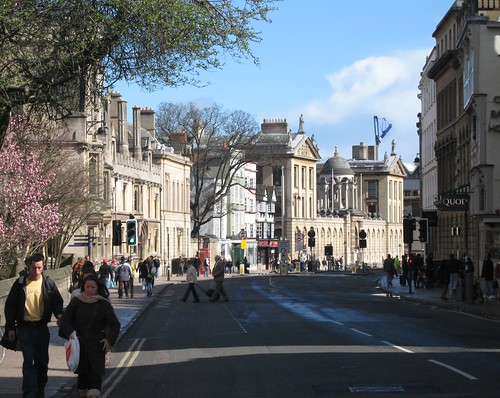The High at Oxford rarely looks like this. Usually it is full of buses. But between 1881 and 1913 there was a horse tramway, part of a route between the station and Cowley Road. Eventually there were two other routes, from the city centre to Walton Street and from Abingdon Road to Banbury Road. By the early years of the twentieth century, Oxford was one of the few systems not to be run by electricity. Proposals for electrification were put forward, but the University was opposed to having overhead cables in the High and there were doubts over the safety of a suggested stud-contact system. The alternative conduit system adopted in London would have met the need but in the end Oxford's trams were replaced by buses.
These days, two companies are in competition with each other on the main bus routes, so there is far more clutter than there would ever have been if there were trams. Ideas for trams come up now and again but still founder on opposition to having overhead cables in the High. This is a problem of perceptions as many continental cities - Vienna, Prague, Helsinki, for instance - run their tramways through streets with historic architecture. The overhead cables and poles are carefully designed and just form part of the street furniture. There are, however, many ways of running trams without overhead cables, such as battery or flywheel drives, or inductive electricity supply systems.
Proposals for trams in Oxford also come up against problems due to the street layout of the city. The streets branch off in many different directions and there is no one obvious route for the trams. Or so it would seem. But in fact there appear to be certain routes which carry many more buses than the others, which suggests the following three potential routes which would pick up the bulk of the present bus traffic. In principle, these are
- Summertown - Cornmarket - Abingdon Road
- Botley Road - High Street - Headington
- Station - High Street - Cowley

Kommentarer